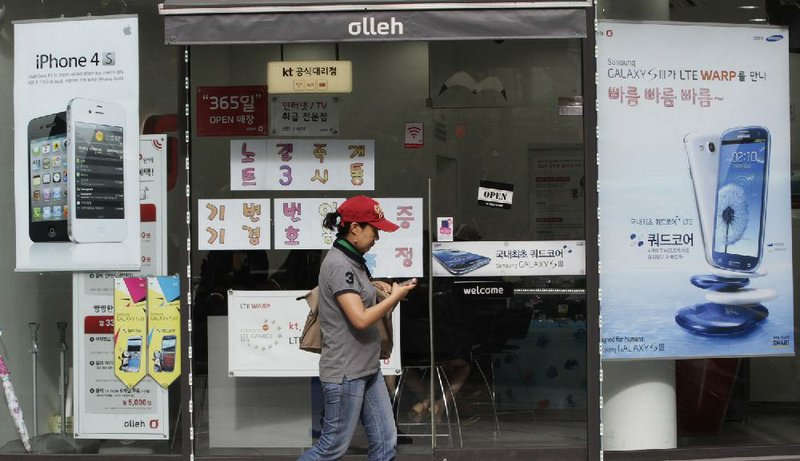LITTLE ROCK — A California jury on Friday found that Samsung Electronics Co. infringed on six of seven Apple Inc. patents for mobile devices and awarded Apple more than $1.05 billion.
The lawsuit is the first to go before a U.S. jury in a fight for dominance of the global smart-phone market.
The nine-member jury also determined that all of Apple’s patents at stake in the trial were valid. The jury began delivering its verdicts Friday afternoon in federal court in San Jose, Calif. An appeal is expected.
The speed of the decision, reached after a four-week trial and less than three days of deliberations, came as a surprise to technology experts and other observers, who had predicted that a verdict wouldn’t be reached before next week at the earliest. During the deliberations, the jury never sent out a question or note to the judge.
Jurors heard each side present about 25 hours of evidence and testimony at the trial before they started deliberating Wednesday. The panel was given more than two hours of instructions and a 20-page verdict form.
Apple, based in Cupertino, Calif., sued Samsung in April 2011, and Samsung counter sued as part of a battle being waged on four continents over a smartphone market valued at $219.1 billion, according to Bloomberg Industries. The jury awarded Samsung nothing in damages in its counter suit. The companies have also sued each other in the United Kingdom, Australia and South Korea.
During closing arguments, Apple attorney Harold McElhinny claimed that Samsung was having a “crisis of design” after the 2007 introduction of the iPhone, and executives with the South Korean company were determined to illegally cash in on the success of the device.
Samsung’s lawyers countered that it was simply and legally giving consumers what they want: smart phones with big screens. They said Samsung didn’t violate any of Apple’s patents and further alleged that innovations claimed by Apple were actually created by other companies.
Awarding damages was one of the more than 600 questions the jury was asked to address. Apple sought $2.5 billion to $2.75 billion for its claims that Suwon, South Korea-based Samsung infringed four design patents and three software patents in copying the iPhone and iPad. Samsung’s demand for as much as $421.8 million in royalties was based on claims that Apple infringed on five patents.
Apple also wants to make permanent a preliminary ban it won on U.S. sales of a Samsung tablet computer and extend the ban to Samsung smart phones. U.S. District Judge Lucy Koh, who presided over the San Jose trial, would decide that question herself without the jury.
The patent disputes began when Samsung released its Galaxy smart phones in 2010. Steve Jobs, the co-founder of Apple who died Oct. 5, initiated contact with Samsung over his concerns that the Galaxy phones copied the iPhone, according to trial testimony.
Samsung and Apple are the world’s two largest makers of the high-end hand-held devices that blend functions of a phone and a computer. They are battling each other in multiple courts even as they are bound by commercial deals involving the sale and supply of components. Apple accounts for about 9 percent of Samsung’s revenue, making it the company’s largest customer, according to a Bloomberg supply-chain analysis.
In the second quarter of this year, consumers worldwide bought 406 million mobile phones compared with 401.8 million in the same period last year, with Samsung and Apple shipping almost half of those phones, according to IDC, a research firm based in Framingham, Mass.
Samsung extended its lead over Apple during the second quarter, shipping 50.2 million mobile phones, representing 32.6 percent of the market, compared with 26 million units, or 16.9 percent of the market, for Apple, according to IDC.
Both sides have had legal victories. Apple won a U.S. court order June 29 blocking sales of Samsung’s Galaxy Nexus smart phone, the first smart phone to use Google Inc.’s Android 4.0 operating system. The product has remained on the market as Samsung appeals the order to the U.S. Court of Appeals for the District of Columbia Circuit.
In November, Samsung won a battle in an Australian court that allowed customers to buy Samsung’s rival to the iPad.
A Seoul court earlier Friday ordered each company to stop selling some smart phones and tablets in South Korea and pay damages after ruling that they infringed on each other’s patents.
The U.S. case is one of some 50 lawsuits among many telecommunications companies jockeying for position in the growing $219 billion market for smart phones and computer tablets.
Apple Inc’s surging stock pushed the company’s value to more than $621 billion on Monday, beating the record for market capitalization set by Microsoft Corp. in 1999 and making it the world’s most valuable company.
Apple shares rose 59 cents Friday to close at $663.22. Shares jumped as high as $12 in after hours trading following the verdict.
Information for this article was contributed by Joel Rosenblat of Bloomberg News, Paul Elias of The Associated Press and Andrea Chang and Jessica Guynn of the Los Angeles Times.
Front Section, Pages 1 on 08/25/2012

